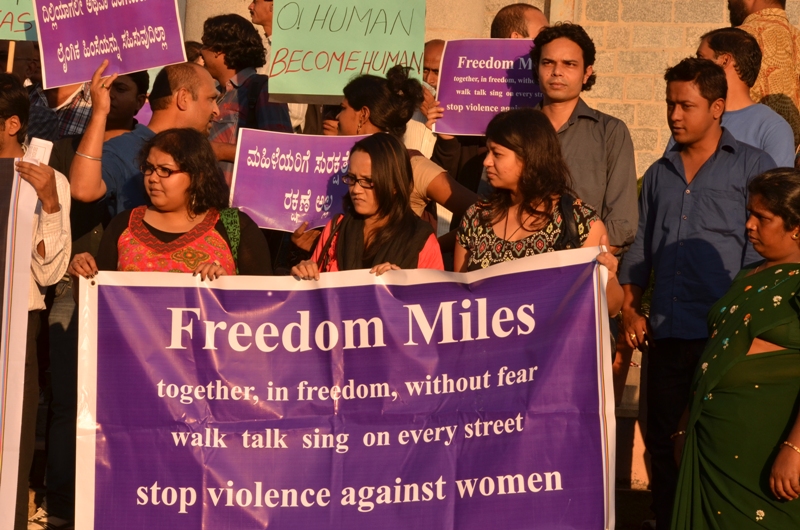This article has been written by Pragya, a student of New Law College, BVDU, Pune and Gaurav Prakash, an advocate.
Table of Contents
Introduction
As Indians, we all get archaic by what we watch on television or in movies. Movies are the part and parcel of our life. We learn how to dance, how to romance and even how to impress our love interest through movies. One thing that was always shown in a bad taste was the hero of the movie chasing a girl despite her turning down the advances of the male protagonist. This message has misguided a lot of youth and especially those who have the eligibility of being called as one side lovers. Even if girls seriously deny the proposals their denial is not taken seriously. This mindset and perception carry over even when a boy becomes a husband and the opinions and aspiration of his wife in bed is also of no or little significance. But this misguidance was tarnished by Amitabh Bacchan in the year 2016 when he showed us the meaning of No in the Movie “Pink”. In the movie, Amitabh Bachchan stated that when a woman says no, she means so and one should stop that time.
Society keeps on reconstructing and sometimes that reconstruction is quite evident in movies. It is not necessary that rape can be committed by a stranger, sometimes the offender can be your husband. Women sometimes are not safe even at their homes. Justice Verma Committee which was formulated after Nirbahya Case stated that its time that India should make law on Marital Rape. But on the other hand, The Indian Penal Code gives primacy to marital status over consent. Section 375 of the Indian Penal Code defines the Offense of Rape stating that a man is said to commit “rape” if he penetrates his penis, to any extent, into vagina, mouth, urethra or anus of a woman or make her do so with another person. The exception in Section 375, which deals with rape, states that sexual intercourse “by a man with his wife, the wife not being under fifteen years of age, is not rape”.
Where both of them are separated, while an act of rape is recognised, it carries a far lesser sentence — Section 376 [1] states that punishment for rape should be seven years to life; Section 376B fixes the punishment for non-consensual sex with a wife who is separated at only two to seven years. [2] The state, while providing an exemption in cases of marital rape, makes a classification between married and unmarried women i.e. Differentiation based on marital status. This differentiation is neither reasonable nor does it further the object of the given Act (in this case, IPC). Moreover, it is arbitrary. Hence, it is submitted that it violates Article 14 of the constitution and Article 21. Article 21 of the Constitution provides that no person shall be deprived of his life or personal liberty except according to the procedure established by law.
Another anomaly is when the exemption is for only those cases of rape committed against women above the age of 15 years, why is there a lesser penalty of 2 years imprisonment as against 10 years imprisonment in other cases. These are some questions which the judiciary of our country, unfortunately, fails to decode. Judiciary system of our country is very much satisfied with not accepting the fact that marital rapes can happen in a country where marriage is considered as a sacred institution, but they fail to notice some of the statistics which are quite alarming for preventing the criminalisation of Marital Rape. Let us look at the shocking incidents across the country.
Interesting Facts
Rape conducted by husband is called Marital Rape. Sexual relationship when conducted by force or threat takes the shape of Rape. According to the UN report on India, about 2/3 of women aged between 15 and 50 have been the victim of marital rape or sexual rape. India being conservative on the issue of sex generally oppressed the victims. According to NCRB, 98% of all rapes involve perpetrators familiar to survivors. These presumably include friends, acquaintances, colleagues, and relatives. But husbands? [3] A wife is expected to fulfill all the wishes of her husband and agreeing for sex is one of them. His sexual appetite is the responsibility of a wife which she has to bear even if she is not at all interested in doing so. Women’s independence, integrity, dignity, right to live, all and everything are alienable; sometimes she is staked and diced as a possession, sometimes she is required to prove her fidelity by entering fire. Sometimes her survival is contested legally and politically. She exists in the body with no self-identity separated from family. She is socially and politically dead with no expression and no claims. Women cannot speak of their issue to anyone and in our country, no law considers this as a legal offence.
Marital rape cannot be made a criminal offence as it could become a phenomenon that may destabilise the institution of marriage and an easy tool for harassing the husbands, as it is already been witnessed by our country that section 498A IPC has become an easy tool by wife for harassing her in-laws. But this cannot be the sole reason for denial of criminalisation of marital rape as many laws are subject to misuse and one cannot deny the fact that every woman has the right over her body irrespective of her relationship status. The mental state of our society also plays an important role here as our society expects women to withstand all the mental torture, physical torture to protect the marriage. The word adjust is often used by our society to persuade women to bear all those sufferings in which a rape victim suffers in the hands of her husband. In over 80 countries in the world, marital rape is considered a crime but marriages in India are considered too sacred that it has not come under legal ambit. The question here arises, why does the act of rape or sexual violence changes when it is done with wife by her husband and when it is done by a stranger to a woman.
Complexities and contradictions have become part and parcel of our legal system. Here rape is considered rape in the live-in relationship whether the duration of the relationship is long or short but this is not the case in marriage. According to Supreme Court judgment, live-in relationship couples are treated the same as legally wedded couples. In the case of S.P.S. Balasubramanyam vs Suruttaya [4] the court stated that if a couple is living together for several years with each other and a child is born out of their relationship then in that condition it will be considered as a legitimate child. The question arises if live-in partners can file a case of rape or sexual harassment against their spouses then why that legal remedy is not given to the wife who is legally wedded to her husband. In yet another case of Suchita Srivastava v. Chandigarh Adminstration,[5] the Supreme Court, while considering a case on abortion, held that “There is no doubt that a woman’s right to make reproductive choices is also a dimension of ‘personal liberty’ as understood under Article 21 of the Constitution of India.

Given this, a woman’s right to privacy, dignity and bodily integrity should be respected. This means that there should be no restriction whatsoever on the exercise of reproductive choices such as a woman’s right to refuse participation in sexual activity or the insistence on the use of contraceptive methods’. The court also observed that rape can be equated with a `grave injury to the mental health’ of a woman. In the light of recent UN reporting, it stands true that women in India are 40% more likely to be raped by their husbands than by a stranger. In 2015, a woman reported having been raped and assaulted by her husband, and though she was hospitalised for the injuries she suffered, her husband was not prosecuted. When she filed a petition before the Apex Court of India, it was dismissed with the court saying that “the law was not to be changed for the experience of one individual.
Haryana- Land of the Lowest sex ratio
A social survey was done in Haryana where it was found that people find it difficult to understand that a wife cannot be raped in society, as it is the sole duty of her husband to quench his thirst for sex and she has to abide by him. Next, one of the most shocking thing which was quite evident in the survey was that people lacked any compassion for the victim, people bluntly stated that one cannot be blamed for rape as both are equally responsible for it. If a stranger rapes a girl then her clothes, her attitude is blamed for rape and if her husband tries to sexually molest or rapes her then it is not even considered as legal offence as one of the reasons for marriage is to fulfill sexual desires. Let us look at some incidence narrated by the sexual victims who were the better halves of their husbands.
Janaki is both physically and psychologically distraught. She was raped by her husband, not once but on many occasions. She confides in her mother. But to her utter shock, her mother confesses that she has been subjected to a similar fate in her own married life. In disbelief, Janaki snaps, “But dad loves you so much!” The mother justifies, “In the bedroom, he doesn’t ask for permission.” And now it’s been so long that she has surrendered herself to the unpleasant feeling. Men believe that it is their sole responsibility to be not only dominating but they should be in full control of their spouses as these are some of their unique ways of proving their masculinity.
Anuja Shah, an online senior family therapist at ePsyClinic explains, “I once got a very disturbing as well shocking case where the woman was so traumatized that the child born out of wedlock reminded her of the brutality of her bedroom.” She adds, “Once married, men reckon that any sort of sex he indulges in with the wife is normal.
Marital rape laws in other countries
Marital Rape is considered as a criminal offence in about 106 countries and is documented as a violation of Human Rights. Among the 106 countries, 32 consider it as a special criminal offence, and the remaining 74 include it in the general rape provisions. United Nations has repeatedly asked our country to make a law against marital rape but our government is not considering it as unworthy of repealing or even amending.
Australia, under the footprint of the second wave of feminism in the seventies, was the first common law country to pass reforms in 1976 that made rape in marriage a criminal offence. In the two decades before that, several Scandinavian countries and countries in the Communist bloc passed laws criminalizing spousal rape including Sweden, Norway, Denmark, and the former Soviet Union and Czechoslovakia. Poland in 1932 was the first to have a law explicitly making it a criminal offence.
At least some countries in this world are talking sense here. According to the UN Women’s 2011 report, out of 179 countries for which data was available, 52 had amended their legislation to explicitly make marital rape a criminal offence. The remaining countries include those that make an exception for marital rape in their rape laws, as well as those where no such exception exists and where, therefore, the spouse can be prosecuted under the general rape laws.
Conclusion
Society changes with time and we must also change our laws with time. In Ancient India of our country, Sati Pratha was a custom that was rigorously followed by our country but it was halted completely in the year 1861 by Queen Victoria. Now the time has come that we should criminalise this menace called Marital Rape.
There are some suggestions which our government should consider:
- We should move towards criminalization of marital rape by dismantling Rape as an exception to marriage.
- The spouse against whom the act of marital rape has been committed will be entitled to maintenance.
- Marital rape should be considered as one of the grounds for granting divorce as well as custody of children.
- Amending procedural and evidence laws to incorporate such norms as maintenance and other such rules marital rape.
- One of the important questions arises here is that how can one prove that a woman has been raped by her husband as in other rape case sperm or DNA samples can prove that rape was conducted by the rapist. So, in these cases, circumstantial evidence and circumstances should be taken into consideration as marital rape cannot be the lone incidence. It must be accompanied by sexual assault, physical assault. If there was a history of domestic violence, chances of marital rape cannot be ignored. Marital rapist should not be easily spared and granting of divorce should not be the only legal remedy available to victims of marital rape.
Our country cannot headway until and unless women are not prevented from social oppression even in the hands of their husbands and it is the right time when a wife should be seen as a different entity from her husband. The wife has the sole right on her body even after the consummation of marriage and rape is a rape irrespective of who the offender is.
References
- Indian Penal Code, 1860
- http://indianexpress.com/article/india/meet-anam-marital-rape-survivor-criminal-offence-delhi-high-court-4847094/
- Livemint.com
- reported in 1994 AIR 133, 1994 SCC (1) 460
- (2009) 9 SCC 1
LawSikho has created a telegram group for exchanging legal knowledge, referrals and various opportunities. You can click on this link and join:
 Serato DJ Crack 2025Serato DJ PRO Crack
Serato DJ Crack 2025Serato DJ PRO Crack










 Allow notifications
Allow notifications



“Rape” is defined as “the crime, typically committed by a man, of forcing another person to have sexual intercourse or any other form of sexual penetration with the offender against their will”. The government, however, obstinately insists on giving immunity to the man if his victim is his wife.
Minister (MoS Home Affairs), Haribhai Parthibhai Chaudhary, suggests that due to factors such as level of education/ illiteracy, poverty, myriad social customs and values, religious beliefs etc., marriage is a sacrament, etc. in India. Therefore, marital rape cannot be criminalised. In short, marriage is a license for the man to rape his wife.
The justification offered by the Honorable minister – much as the justifications offered by Mukesh Singh – vindicates my view that in our society, rape is acceptable. There is certainly a distinction made with regard to circumstances, but the collective conscience of our nation validates rapes.
You are saying all about men but mostly enemy of women is another women how come you didn’t notice that does only women bear all problems is that what you want to say what about men do they don’t have any value there are number of cases where men and their family are tortured by wife and wife are using Divorce Act / Domestic Violence as a tool for their benefits I think now its time to introduce law for men against Domestic violence against women
Marital rape is lot of noise. but in reality it is rubbish.
it is a very valid ground for a divorce. What more do you want ?
see the alternate reality.
Marital rape is a crime. Man and woman remain as husband and wife. Man goes to jail for 7 years plus for raping his wife. when the husband is released, they live happily ever after. right ?
when marital rape is / would be reported, its the end of marriage.
one more thing.
When a woman wants a divorce, she would add the penal provision for marital rape against the husband. where’s the safeguard ?
So just chill.
There are lot of idiotic laws in India. absence of Marital rape penal provision is not one of them.